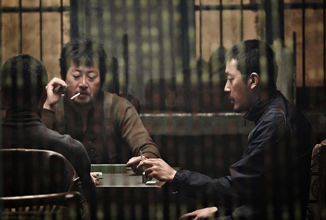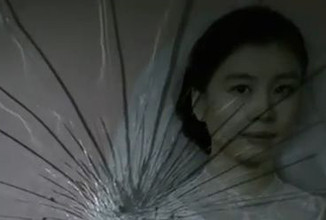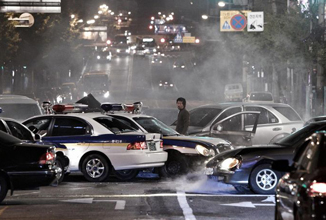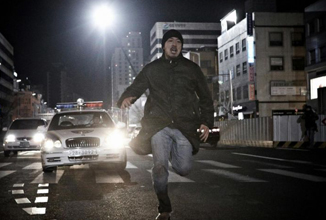Synopsis:
Goo-nam (Ha Jeong-woo) is a Joseonjok (Chinese of Korean descent) working as a taxi driver in Yanji - the capital city of the Yanbian Korean Autonomous Prefecture, where China borders North Korea. The departure of his wife, Hwa-ja (Tak Sung-eun), to work illegally in South Korea has left him with crippling debts, and with no way to even begin to pay them back (as well as being left with the responsibility of looking after their young daughter), he begins to gamble on games of mahjong at a local late night bar in the hope of winning the cash he so desperately needs. However, his inability to win even a single game only exacerbates his financial predicament further, leaving him with nowhere to turn and no way to appease the violent characters to whom he owes the money.
After yet another night gambling and losing heavily, Goo-nam is taken to meet Myun (Kim Yoon-seok) who offers to clear his debts if he will travel to South Korea and kill a man (bringing back his severed thumb as proof of the murder) and, with the realisation that he might also find be able to find his wife while there, Goo-nam finally - and rather reluctantly - agrees to Myun's proposition...
Review:
While The Yellow Sea is split into four distinct sections depicting the differing (ongoing) chapters in Goo-nam's life as well as his ever-changing place within proceedings ("Taxi Driver", "Murderer" etc. - each heralded by yellow text on a black background), the film as a whole feels much more of a tale of two halves.
The first of these, leading up to and including the murder, oozes style and substance throughout, equally unveiling Goo-nam's increasingly desperate situation at the same time as detailing the plight of Joseonjoks as a whole - herded together into a grimy, rundown area and made to feel that they are neither a legitimate part of the Chinese community, nor, in fact, welcome in South Korea - almost people without a home, if you like. Repeated references to these desperate Joseonjoks being driven to do whatever it takes (legal or otherwise) just to be able to scrape together some sort of living underlines this all the more and serves to increase the believability, and viewer understanding, of the choices that Goo-nam really has no option but to make.
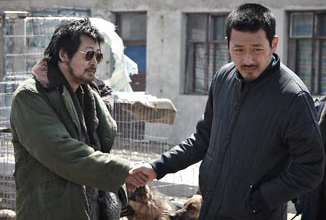 |
 |
From the outset of The Yellow Sea, Goo-nam is shown to be deeply suspicious of strangers while utterly refusing to hear a bad word said against the woman he loves, and this sets the scene for his increasing confusion as he begins to discover that things are far from how he initially believes them to be. The fact that nothing ever turns out the way he wishes it would, regardless of the meticulousness of his plans, is deftly accented by the events surrounding the murder itself, and in one fell swoop forms the basis for the escalation of narrative threads post halfway mark in proceedings - brought on partly by, and partly in spite of, his evermore suspect decisions.
This "second half" of The Yellow Sea racks up absolutely everything to the nth degree - from violence to the sheer number of cascading narrative threads present - and though it could be said that the sheer intensity with which they are collectively depicted somewhat clouds the underlying story and its conclusion, it also mirrors the confusion repeatedly and increasingly faced by a number of the main characters themselves, not least Goo-nam.
Ultimately, the heart-pounding (almost breakneck) manner with which the multitude of separate and inter-connected elements are conveyed (both visually and in terms of plot) largely makes The Yellow Sea what it is, and will undoubtedly be what sticks in viewer minds far more than anything else.
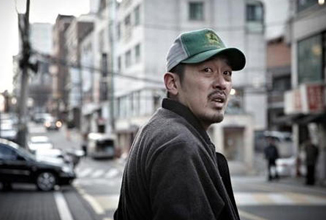 |
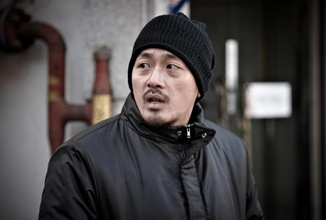 |
Cinematically and visually, The Yellow Sea is frankly incredible, especially in the far more involved second half, to the extent that it would take quite some effort to find another example of a film containing imagery so intensely presented and conveyed. The many chase sequences (the most memorable of which is a jaw dropping scene involving a huge articulated truck) really do feel like insane races against time and the brutal violence regularly portrayed is consistently truly visceral and viscously bloody, to a level which is, at times, almost disturbing.
The Yellow Sea is the first South Korean film made with investment from an American film company (20th Century Fox International) and the film's astounding visuals clearly show that money being put to exhilarating use.
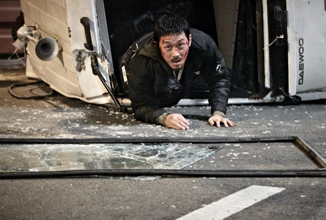 |
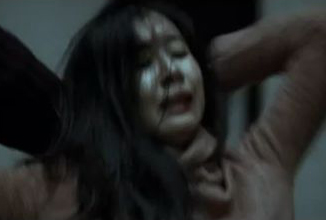 |
Na Hong-jin's pulse-quickening style of direction is so noticeably prevalent in his work (both past and present) as to have become almost his trademark and, as such, it will likely come as next to no surprise to learn that comparisons between The Yellow Sea and The Chaser - his previous (first) film - abound, both online as well as in print. However, though I initially considered doing the very same myself, I ultimately feel that such an approach carries with it the risk of being detrimental to both films.
The fact that the number of narrative threads present differs greatly in each - thereby requiring contrasting narrative focuses and altering the amount of character depth allowed - essentially means that comparisons between the two are, to my mind at least, rather redundant.
Not only that, but each film has its own inherent merits, largely unrelated to the other, which frankly deserve to be viewed within the context of the relevant story in which they appear, rather than simply serving to facilitate criticism of a totally separate cinematic work.
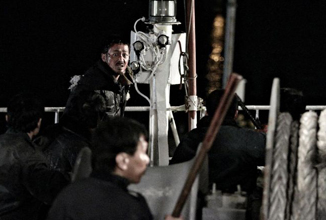 |
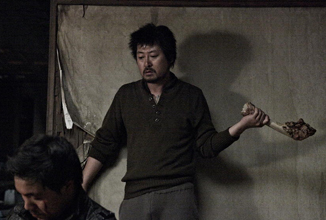 |
Cast:
Ha Jeong-woo and Kim Yoon-seok, who also worked together on Na Hong-jin's previous film, The Chaser, are once again paired up in The Yellow Sea, with Ha Jeong-woo playing Joseonjok Goo-nam and Kim Yoon-seok starring as the shady and violent Myun. Both give exemplary performances throughout and while several other character roles are also vital to overall proceedings, none of the other cast members can really steal the limelight from these two - partly because of character depth limitations, but mainly because Ha Jeong-woo and Kim Yoon-seok's portrayals simply outstrip the rest.
Summary:
The Yellow Sea is a fast-paced, violent and bloody rollercoaster ride which details its numerous narrative threads in an utterly heart-pounding manner, virtually guaranteeing that audiences will be left feeling exhilarated and perhaps even breathless.
Cast (Actor… Character)
Ha Jeong-woo… Goo-nam
Kim Yoon-seok… Myun
Jo Seong-ha… Tae-won
Lee Cheol-min… Seong-nam
Kwak Byeong-gyoo… Professor Seung-hyeon
Tak Sung-eun... Hwa-ja
Lim Ye-won… Professor's wife
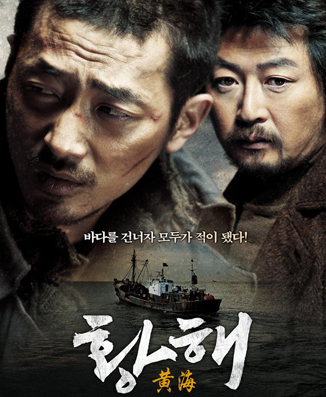 |
|


